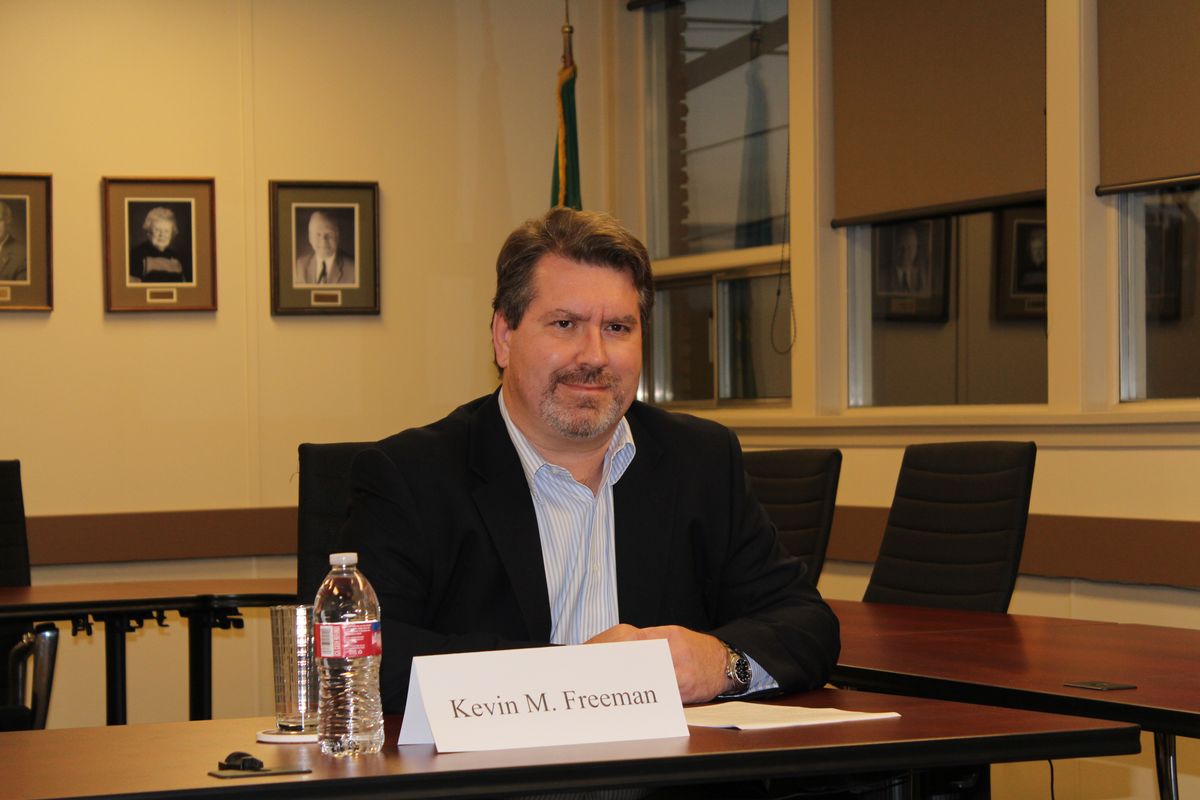Kevin Freeman, Dennis Hamlin battle for Millwood mayor

Millwood mayoral candidates Kevin Freeman and Dennis Hamlin faced off in a candidate forum Tuesday night in Millwood City Council chambers.
Greater Spokane Chamber of Commerce board chairman John Guarisco moderated the debate. The candidates responded to questions from Guarisco and those written by members of the audience.
During the cordial exchange each candidate agreed on the need to expand the Millwood business community, control traffic along Argonne Road and find ways to enhance the City Park.
A key difference between the two candidates is how each plans to fill the role of mayor. Hamlin, a former business owner, intends to turn the office into a full-time position. He stated in an interview before the debate that he anticipates this will raise the salary from $600 a month to $60,000 a year.
“The day after I’m sworn in I will have a cellphone at my side,” Hamlin said during the debate. “That phone will come on at 9 o’clock in the morning and shut off at 4 o’clock in the afternoon.”
Freeman, who’s on the Millwood City Council, would keep the job part-time.
“I think our citizens expect a level of service from the mayor and they want accessibility,” said Freeman, who plans to have designated office hours at City Hall, even meeting with citizens at night if needed. “I too have a cellphone. My cellphone comes on very early in the morning and goes off very late at night.”
Freeman plans to continue working at his full-time job while mayor, similar to how previous mayors have handled the office.
In response to a general question about waste in city spending, Freeman said the city operates using the least amount of staff required by the state.
“We run a lean ship here,” Freeman said. “We endeavor to make sure the money we bring in is not wasted.”
Hamlin proposed saving money by no longer using outside contractors and purchasing equipment such as a street sweeper and line striper for city employees to use. After making these capital purchases, he estimates that he can put money back into the general fund within three years.
“I can purchase a brand new computerized line striper for $10,000,” Hamlin said, who said it costs the city $6,000 a year to stripe its arterials. “Why are we spending this money year after year?”
Responding to a question from the audience, Hamlin addressed what he would do to help business owners.
“I would be the first mayor to hold a business owner luncheon,” Hamlin said. “Let these people tell us what would benefit them to help get the traffic through the door.”
He further plans to find ways to help businesses advertise and market themselves.
“That is where I would focus with these guys, changing these ordinances on their signage,” Hamlin said. “Let them have their reader boards. Let them show their sales.”
Freeman, who intends to work with the business community to invigorate the Millwood commercial district, disagreed with Hamlin’s approach to signage.
“It doesn’t matter if we have a great sign out there. If folks can’t get to these businesses … people aren’t going to stop,” Freeman said, noting that he believes increased access is key for Millwood businesses. “We as a city need to look at ways that we can increase the traffic flow to our business districts, particularly across Argonne.”
Responding to a question about traffic flow along Argonne, Hamlin said Inland Empire Paper Mill’s semitrucks are a main concern, blocking traffic when turning left off Argonne. He proposes working with the state and the mill to secure funding for constructing left turn lanes. Inland Empire Paper is owned by Cowles Co., which also owns The Spokesman-Review.
“If we could get them in some turn lanes and get them off the flow of traffic,” Hamlin said, “That would be a start making those trucks more invisible.”
Freeman said the council commissioned a traffic flow study on Argonne and found there is room for turn lanes with modifications. Lack of funding is the reason the city hasn’t pursued the project.
“Even as much traffic as Argonne has, it’s not a state road,” Freeman said about the inability to get state funding for the project. He plans to seek funding alternatives to construct turn lanes on Argonne.